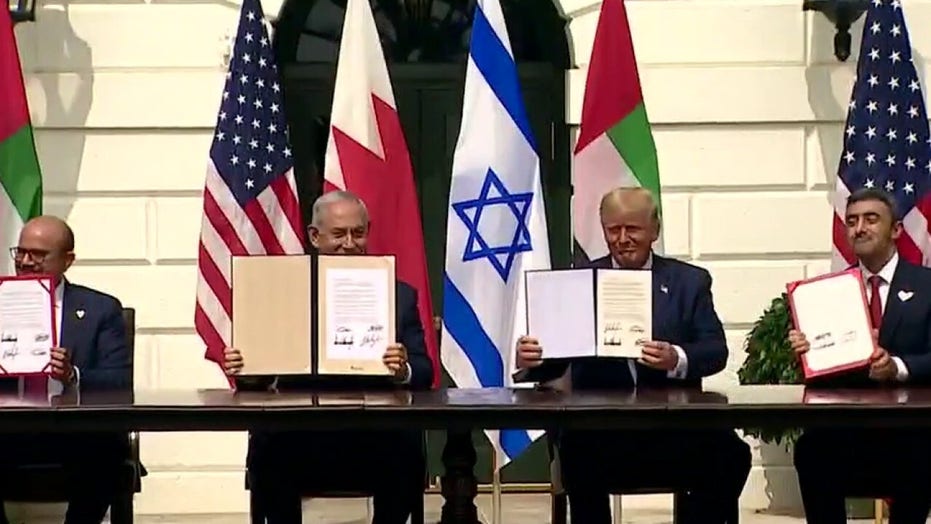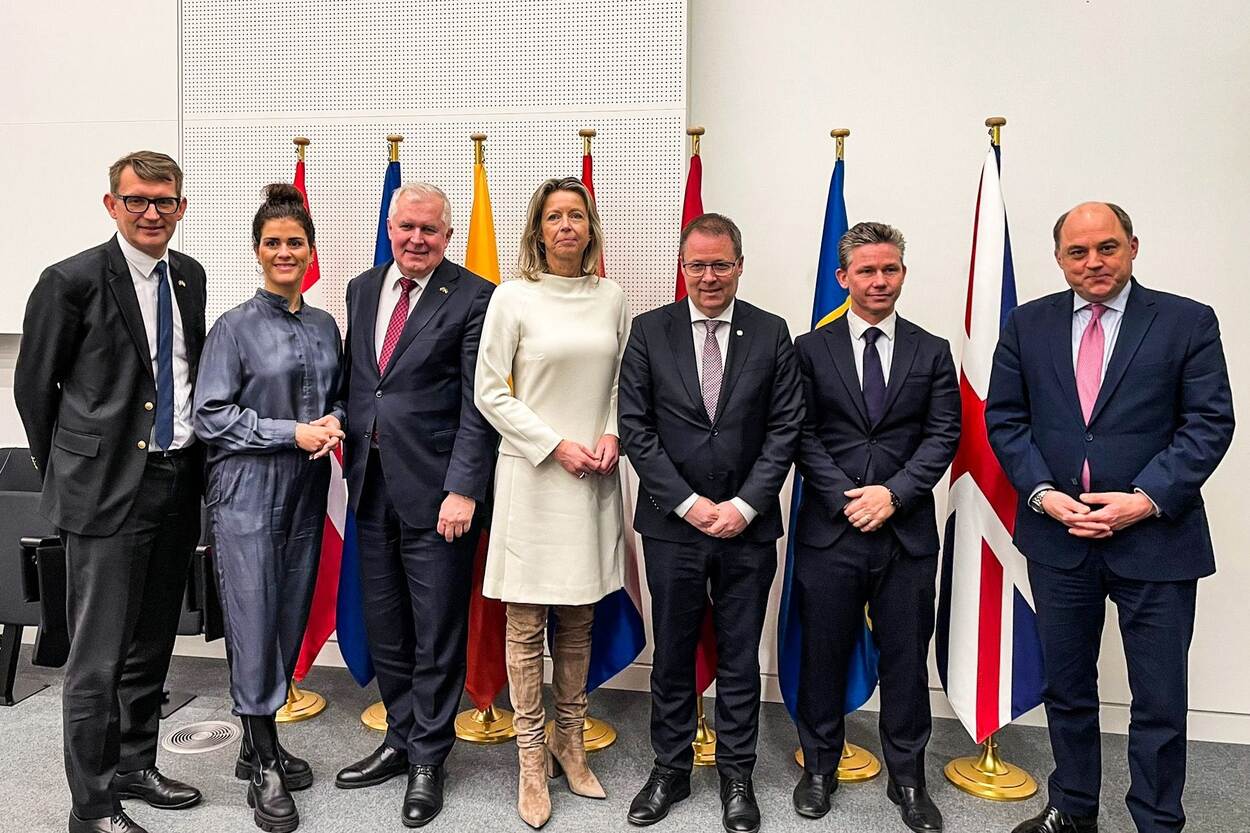Trump's Middle East Policy: A Shift In Power Dynamics Between Arab States And Israel?

Table of Contents
The Abraham Accords: A Landmark Achievement or a Tactical Shift?
The Abraham Accords, brokered by the Trump administration, represent a pivotal moment in Middle Eastern diplomacy. These normalization agreements between Israel and several Arab nations – the UAE, Bahrain, Morocco, and Sudan – dramatically reshaped the regional landscape.
Normalization of Relations:
The Accords brought about unprecedented diplomatic relations, fostering closer ties between Israel and previously hesitant Arab nations.
- Economic Opportunities: Increased trade and investment flows between Israel and the signatory nations, opening new economic avenues.
- Security Cooperation: Enhanced intelligence sharing and collaborative efforts to counter terrorism, bolstering regional security.
- Counter-Terrorism Efforts: Joint initiatives to combat extremist groups, leading to a more unified front against terrorism in the region.
The strategic implications are profound. The Accords potentially signal a shift away from the traditional Arab consensus prioritizing the Palestinian issue above all else. However, critics argue that the agreements prioritize short-term gains over long-term peace prospects. The true long-term impact of the Abraham Accords on regional stability remains to be seen, particularly considering the inherent complexities of the Middle East. Further research into the Abraham Accords and their impact on Israel-UAE relations and Israel-Bahrain relations is crucial for a comprehensive understanding.
Palestinian Concerns and Reactions:
The Palestinian Authority vehemently criticized the Abraham Accords, viewing them as a betrayal of their cause and a circumvention of the traditional peace process.
- Bypass of Palestinian Negotiations: The Accords were negotiated without meaningful Palestinian input, undermining their perceived role in any future peace settlement.
- Erosion of the Two-State Solution: Some analysts argue that the Accords weaken the prospects for a two-state solution, as they implicitly legitimize the status quo and marginalize Palestinian aspirations.
- Continued Israeli Occupation: The Accords did not address core issues like Israeli settlements in the West Bank, making the path to a just peace seemingly more distant.
The Palestinian reaction highlights the inherent complexities of Trump's Middle East policy. While promoting normalization between Israel and some Arab nations, the agreements simultaneously deepened the already existing rift between Israel and the Palestinians, hindering potential progress on the Israeli-Palestinian conflict and peace negotiations.
Shifting Alliances and Regional Rivalries:
Trump's Middle East policy significantly impacted regional alliances and rivalries, particularly concerning Iran.
Impact on Iran:
Trump's withdrawal from the Iran nuclear deal (JCPOA) in 2018 drastically increased tensions between Iran and its regional rivals.
- Increased Tensions: The withdrawal led to renewed sanctions against Iran, escalating regional tensions and increasing military posturing.
- Proxy Conflicts: The heightened tensions exacerbated existing proxy conflicts, fueling instability across the region, particularly in Yemen and Syria.
- Regional Instability: The uncertainty surrounding Iran's nuclear program and the increased regional tensions created a volatile environment impacting the Gulf Cooperation Council and other regional organizations.
The policy towards Iran fundamentally altered the regional security landscape. While aimed at curbing Iranian influence, it arguably led to greater instability.
The Role of Saudi Arabia:
Saudi Arabia's relationship with both the US and Israel evolved under Trump's administration, driven by mutual concerns about Iran.
- Shared Concerns about Iran: Shared anxieties regarding Iran's regional ambitions led to closer cooperation between Saudi Arabia and Israel, despite a lack of formal diplomatic ties.
- Shifting Foreign Policy Priorities: Saudi Arabia's foreign policy arguably shifted slightly, reflecting the evolving regional dynamics and the desire for stronger security partnerships.
- Implications for Oil Markets: The geopolitical shifts have had consequences for global oil markets, highlighting the interconnectedness of geopolitics and energy security.
The changing Saudi position reflects the multifaceted impact of Trump's Middle East policy on regional players and their strategic decisions.
The Legacy of Trump's Middle East Policy:
Trump's Middle East policy had a lasting impact, reshaping regional dynamics and leaving a complex legacy.
Long-term Effects on Regional Stability:
The long-term effects of Trump's policies remain uncertain. Did they contribute to lasting peace or increased instability?
- Potential for Future Conflicts: Increased regional tensions and unresolved issues could easily lead to new conflicts or the escalation of existing ones.
- Cooperation vs. Conflict: The future will likely see a mix of cooperation and conflict, as nations navigate the shifting power dynamics.
- Impact on US Foreign Policy: Trump's policies redefined the US role in the Middle East, possibly signaling a decreased US commitment to resolving regional conflicts.
Assessing the long-term consequences requires careful monitoring of regional developments.
Comparison with Previous Administrations:
Compared to previous administrations, Trump's approach was distinctly different.
- Emphasis on Bilateral Deals: Trump prioritized bilateral agreements over multilateral initiatives, a stark contrast to Obama's focus on the Iran nuclear deal.
- Reduced Emphasis on Palestinian Statehood: The Trump administration significantly downplayed the pursuit of a two-state solution.
- Prioritization of Strategic Partnerships: The Trump administration prioritized strengthening strategic partnerships with key regional allies.
Analyzing these differences allows for a richer understanding of the evolution of US Middle East policy and its impact on the region.
Conclusion:
Trump's Middle East policy undeniably created significant shifts in the power dynamics between Arab states and Israel, most notably through the Abraham Accords. While these agreements fostered unprecedented normalization, they also raised concerns regarding the Palestinian issue and long-term regional stability. Analyzing the complexities of shifting alliances, the impact on Iran, and the legacy of Trump's approach is crucial to understanding the current state of affairs and predicting future developments in the Middle East. Further research and analysis are needed to fully grasp the lasting implications of Trump's Middle East policy and its effect on the future of the region. Understanding the nuances of Trump's Middle East policy is critical for navigating the evolving geopolitical landscape of the region.

Featured Posts
-
 Late Game Heroics Riley Greenes Two Home Runs Lead Tigers To Win Over Angels
May 18, 2025
Late Game Heroics Riley Greenes Two Home Runs Lead Tigers To Win Over Angels
May 18, 2025 -
 Groeiende Steun Voor Uitbreiding Defensie Industrie Nederland
May 18, 2025
Groeiende Steun Voor Uitbreiding Defensie Industrie Nederland
May 18, 2025 -
 Ego Nwodims Snl Sketch Sparks Audience Outcry
May 18, 2025
Ego Nwodims Snl Sketch Sparks Audience Outcry
May 18, 2025 -
 Canada Post Door To Door Mail Delivery Commission Report Recommends Phase Out
May 18, 2025
Canada Post Door To Door Mail Delivery Commission Report Recommends Phase Out
May 18, 2025 -
 Did Julia Fox Copy Bianca Censoris Style Fans React To Risque Outfit
May 18, 2025
Did Julia Fox Copy Bianca Censoris Style Fans React To Risque Outfit
May 18, 2025
Latest Posts
-
 Amanda Bynes Launches Only Fans A New Chapter At 50 Month
May 18, 2025
Amanda Bynes Launches Only Fans A New Chapter At 50 Month
May 18, 2025 -
 Amanda Bynes Only Fans 50 Monthly Subscription After 15 Year Acting Hiatus
May 18, 2025
Amanda Bynes Only Fans 50 Monthly Subscription After 15 Year Acting Hiatus
May 18, 2025 -
 Dodgers Beat Mariners 6 4 Confortos First Home Run For La
May 18, 2025
Dodgers Beat Mariners 6 4 Confortos First Home Run For La
May 18, 2025 -
 Confortos First Dodgers Home Run Powers 6 4 Win Over Mariners
May 18, 2025
Confortos First Dodgers Home Run Powers 6 4 Win Over Mariners
May 18, 2025 -
 Amanda Bynes Classmate Claims Tragic School Ritual
May 18, 2025
Amanda Bynes Classmate Claims Tragic School Ritual
May 18, 2025
